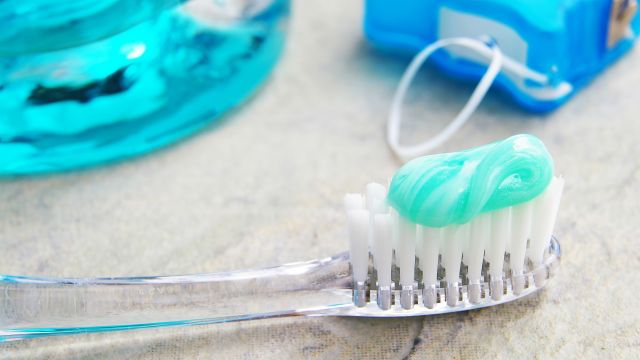Updated on September 2, 2024.
Americans spend hundreds of dollars a year on personal care products designed to improve bad breath, smelly armpits, and intimate aromas. But the fact is, odors are human. As long as you bathe, brush, and floss regularly, there's no need for high-priced sprays or washes. However, if you want tone down certain smells, there are simple solutions that don’t cost a fortune.
We spoke with family medicine physician Gretchen Dickson, MD, of Wesley Medical Center in Wichita, Kansas, about three types of body odors—and how you can freshen up when they’re more pungent than usual.
Your breath
Everyone can get bad breath once in awhile. It's often caused by eating foods like garlicky pasta or a tuna sandwich. But it can happen for other reasons, too. For example, poor oral hygiene can leave food behind in your mouth and encourage bacterial growth that causes unpleasant odors. Bad breath may also be a sign of a sinus or lung infection. Although less typical, chronic illnesses—like kidney or liver failure, and diabetes or GERD—can contribute, too.
Tips: Follow proper oral care guidelines. That means brushing your teeth and tongue twice daily along with flossing once a day and using sugar-free gum when you’re without a toothbrush. Eating a healthy, high-fiber diet can help, as well. “High-sugar foods and high-fat foods that break down in your mouth smell worse than if you eat something high in fiber,” says Dr. Dickson. She also recommends drinking plenty of water, because your breath can worsen if your mouth is dry.
Your armpits
Stress, food, and hormonal shifts can increase the growth of natural skin bacteria that call your armpits home.
Your armpit is warm and moist, and as a general rule, most people sweat under their arms more than other areas of their body. The chemical breakdown of that sweat can lead to underarm smell. There are a number of reasons someone’s underarm odor may be stronger than other people’s odor. Physiologically, your body composition may just cause you to sweat more. In other cases, even if you sweat the same amount as someone else, your armpit bacteria may be more active in that region, which can cause a stronger odor.
Tips: Wash frequently and try different kinds of deodorants or antiperspirants until you find one that works for you, says Dickson. And if the amount of sweat bothers you, there are medications you can take to help decrease sweating. For example, injections of Botox in the armpits can be a safe and effective treatment for excessive sweating. Talk to your healthcare provider (HCP) about which option may work best for you.
Vaginal area
Vaginal odors increase and decrease naturally with your monthly hormonal cycle. “I think most people have a sense of what's normal for them," Dickson says. "But if they notice a change like a stronger or more unpleasant smell, they should discuss it with their doctor."
A strong fishy odor, especially after you've had sex, is a typical symptom of bacterial vaginosis (BV), an overgrowth of bacteria. Other potential causes include:
- Sweating
- Leaving in a tampon too long
- Infections
- Sexually transmitted illnesses (STIs)
- Allergic or irritating reactions to things such as scented soaps or body washes
In older people, bladder issues such as urinary incontinence may cause unpleasant odors.
Tips: Your first instinct may be to douche, but don’t, advises Dickson. See your HCP or visit urgent care before trying any home treatments, so they can identify the underlying cause of the odor. And while Dickson says good hygiene is important—like showering after a sweaty gym session—overdoing it may actually decrease your beneficial vaginal bacteria and worsen the smell. Dickson also advises washing with mild soap, rinsing well, and wearing cotton underwear during the day and none at night while you're sleeping, to encourage air circulation. Take a break from tight, skinny jeans, and change out of wet or sweaty clothing promptly.






